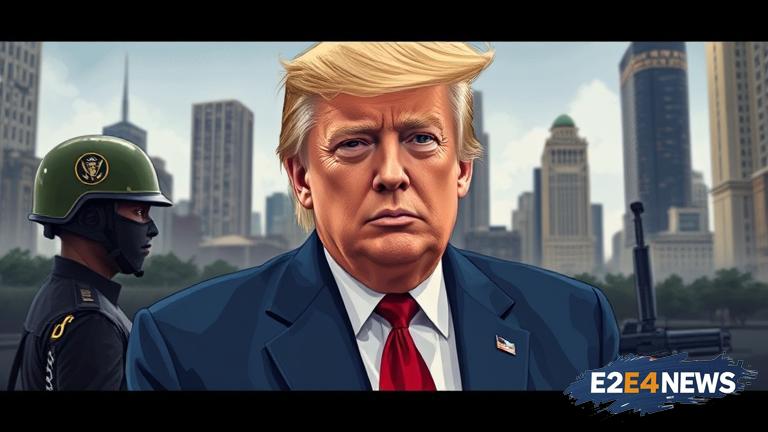In a recent statement, US President Donald Trump hinted at the possibility of deploying the US military to Chicago to combat rising violence in the city. This announcement has sparked a heated debate among citizens, officials, and lawmakers, with some expressing concern over the potential consequences of such a move. The city of Chicago has been plagued by high levels of violence, with a significant increase in homicides and shootings in recent years. According to official statistics, Chicago has recorded over 700 homicides in 2022 alone, with many more injured in violent incidents. The rising violence has led to widespread concern among residents, business owners, and community leaders, who are calling for urgent action to address the issue. President Trump’s suggestion of deploying the US military to Chicago has been met with a mix of reactions, with some supporting the move as a necessary measure to restore order and safety, while others have expressed opposition, citing concerns over the potential for human rights abuses and the erosion of civil liberties. Some have also questioned the legality of deploying the military to a domestic city, arguing that it would be a violation of the Posse Comitatus Act, which prohibits the use of the military for law enforcement purposes. Despite these concerns, President Trump has maintained that the deployment of the US military to Chicago is a possibility, stating that the city’s violence is ‘out of control’ and that ‘something needs to be done’. The President’s comments have been seen as a reflection of his administration’s ‘tough on crime’ approach, which has been a hallmark of his presidency. However, critics argue that this approach has been ineffective in addressing the root causes of violence and has instead led to increased militarization and aggression. The potential deployment of the US military to Chicago has also raised questions about the role of the military in domestic law enforcement and the potential consequences for civil-military relations. Some have argued that the deployment would be a dangerous precedent, blurring the lines between military and law enforcement roles and potentially leading to the erosion of civil liberties. Others have pointed out that the US military is not trained or equipped to deal with domestic law enforcement issues and that their deployment would be ineffective in addressing the root causes of violence. The city of Chicago has a long history of community-led initiatives and programs aimed at reducing violence and promoting public safety. These initiatives have been shown to be effective in reducing violence and improving community relations, and many are calling for increased investment in these programs rather than the deployment of the US military. Despite the controversy surrounding President Trump’s comments, there is a growing recognition of the need for urgent action to address the rising violence in Chicago. The city’s residents, business owners, and community leaders are calling for a comprehensive approach that addresses the root causes of violence, including poverty, lack of access to education and job opportunities, and social inequality. This approach would involve increased investment in community-led initiatives, social programs, and economic development projects, rather than relying solely on law enforcement or military solutions. The situation in Chicago is a complex and multifaceted issue that requires a nuanced and comprehensive approach. While the deployment of the US military may be seen as a quick fix, it is unlikely to address the underlying causes of violence and may instead exacerbate the problem. As the debate over the potential deployment of the US military to Chicago continues, it is essential to consider the potential consequences of such a move and to prioritize a comprehensive and community-led approach to addressing the root causes of violence. The city’s residents, business owners, and community leaders are calling for a peaceful and sustainable solution that prioritizes the safety and well-being of all citizens, rather than relying on military force. In conclusion, the possibility of deploying the US military to Chicago is a complex and contentious issue that requires careful consideration and debate. While the rising violence in the city is a pressing concern, it is essential to prioritize a comprehensive and community-led approach that addresses the root causes of violence, rather than relying solely on law enforcement or military solutions.
